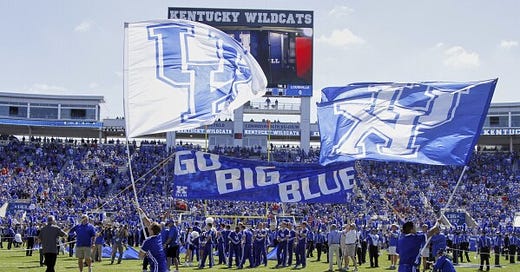In a landmark shift for college athletics, the University of Kentucky has restructured its athletic department into a limited liability company, Champions Blue LLC, marking the first known case of a university athletic program adopting this kind of legal structure. As collegiate sports rapidly evolve in the face of legal and financial pressures, Kentucky’s bold move could foreshadow a broader transformation in how universities manage their athletic operations.
Why Kentucky Made the Change
At the heart of Kentucky’s decision is the shifting economic landscape of college sports. The university’s new LLC structure is a proactive response to several major developments reshaping the NCAA model:
1. Preparing for Revenue Sharing with Athletes
With the NCAA poised to settle the House v. NCAA antitrust case for $2.8 billion, schools may soon be allowed to share up to $20.5 million per year with athletes. This would be a seismic shift in how schools budget and manage athletics. By creating Champions Blue LLC, Kentucky positions itself to absorb this new financial reality more efficiently, giving it flexibility in how it handles payments, benefits, and overall athletic department strategy.
2. Expanding Revenue Opportunities
Operating as an LLC provides Kentucky with greater agility to explore new income streams beyond traditional ticket sales and broadcasting rights. These include:
Public-private partnerships
Real estate ventures
Potential NIL (Name, Image, and Likeness) collaborations
More aggressive fundraising models
The ability to move quickly and act entrepreneurially could give Kentucky a competitive edge, both in sustaining its programs and attracting top talent.
3. Improving Governance and Efficiency
Champions Blue LLC is governed by a board of directors with expertise in sports business, fundraising, and operational management. This structure allows for faster, more strategic decision-making compared to the often bureaucratic university system. It mirrors the more nimble operations of professional sports organizations while maintaining alignment with institutional values.
4. Strengthening Legal and Operational Protections
From a compliance standpoint, the LLC model creates a layer of legal separation between the university and its athletic business operations. This can help mitigate risk, streamline contracts and negotiations, and better navigate NCAA regulations as they continue to shift.
What This Means for Other Universities
Kentucky’s move may serve as a blueprint for other institutions looking to modernize their athletic operations. As NIL deals, revenue-sharing models, and athlete employment conversations gain traction, schools may find that their traditional structures are too rigid to keep up.
However, not every university is in a position to make this leap. Legal, financial, and political hurdles vary across states and institutions. As some experts have noted, strategic alignment across university leadership, donors, and legal advisors is essential to making such a transition successful.
Still, Kentucky’s adoption of the LLC model signals a new era. It’s no longer enough to have winning teams; schools now need winning business models to sustain them.





